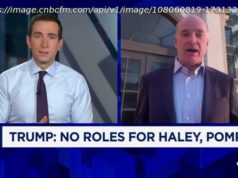The Republican party’s midterms argument is exploiting voters’ fears in Oz vs. Fetterman and Johnson vs. Barnes.
Two years ago, Mary, 55, a resident of New Britain Township, voted for President Joe Biden because she couldn’t stomach the alternative.
“I could not vote Trump because he’s so despicable,” Mary told Vox. (She declined to share her last name in order to protect her privacy.)
This year, however, she’s supporting Mehmet Oz, the Republican running for Senate, because she’s worried that Lt. Gov. John Fetterman is too far to the left. “I have an issue with how risky he is,” she said, citing the “release of criminals” as a key point of concern.
Mary’s worries about crime come as Republicans hammer the subject in the Pennsylvania Senate race — and many other races across the country — as it’s proven to be an effective message for swaying suburban swing voters fearful of upticks in violence during the pandemic.
For Pennsylvanian Republicans, this has meant weaponizing Fetterman’s positions on criminal justice reform, including his advocacy for pardons and sentence commutations, to falsely suggest he wants to free dangerous criminals. Republican ads have claimed that he’d make the state “less safe,” a charge that Fetterman has rebutted by pointing to his record combating shootings as mayor of Braddock, Pennsylvania.
Republicans’ attacks seek to tap renewed voter fears, which follow a recent increase in murders nationwide. While violent crime has been trending downward for decades, Philadelphia was among the places that saw a significant jump in homicides — 57 percent — between 2019 to 2021, an increase that has many people here on edge. Other places including Chicago and Oklahoma City have seen similar trends as murders increased 30 percent between 2019 and 2020 at the national level.
“The surge in messaging is because of a surge in violence that’s taken place. The salience of political messaging about crime goes up when crime goes up,” says Rutgers professor Lisa Miller, who’s studied how criminal justice issues can mobilize voters.
Republicans’ ads have capitalized on these anxieties by misleadingly blaming Democrats for this uptick and exploiting racist assumptions voters may hold about who’s responsible for these crimes. Recent polls and dozens of conversations with voters here make it evident that they’re finding a receptive audience, and moving the political needle. After Republicans spent millions on crime ads in Pennsylvania throughout September, polls between Fetterman and Oz tightened considerably and the Democrat’s favorability numbers took a hit.
Republicans’ spending, too, appears to reflect just how effective they see this line of attack being. All told, Republicans have spent $157 million on crime-related ads at the national level, compared to $105 million on the economy and inflation, according to data from the ad analysis firm AdImpact. And the breakdown is even starker in the Pennsylvania Senate race, where Republicans have spent nearly $12 million on crime ads, compared to $2.5 million on the economy and inflation.
Political scientists note that Republicans have long leveraged attacks on crime — and the racial biases they evoke — but they are resonating more this cycle because of the public’s heightened fears about crime and ongoing backlash toward “defund the police” rhetoric that the GOP has tied to Democrats. “Crime is a pretty potent opportunity right now because it’s been dramatically in the news for the last few years,” says Miller. “It’s a visceral issue.”Messaging on crime is having an impact in Pennsylvania
A trio of billboards right outside Philadelphia quite literally spell out Republicans’ efforts to frame Democrats as “soft on crime.” Against the backdrop of what looks like a boarded-up building, the signs bear a comically simple and menacing message: “Fetterman = poverty and crime.” It’s a statement that’s clearly false, but it illustrates just how explicit Republicans are being in their message to voters on the subject.
Republicans have focused these attacks on places where they see the topic being more relevant to voters: In both Wisconsin and Pennsylvania, for example, there have been significant increases in homicides in major cities like Milwaukee and Philadelphia over the past three years, which have added to local worries in the surrounding suburbs.
Additionally, there have been high-profile news events that have made the issue more salient. The Pennsylvania legislature, controlled by Republicans, has been conducting a controversial impeachment push against progressive Philadelphia District Attorney Larry Krasner, whom they accuse of contributing to higher crime rates, another development that’s renewed focus on the topic.
Fetterman’s record has also left him particularly vulnerable to crime attacks. He’s offered more progressive stances on a host of criminal justice issues, including sentencing reforms for second-degree murder charges and a more expansive approach to clemency — stances Republicans have been all too happy to seize on as they try to stoke anxieties of voters in the suburbs.
Multiple Oz supporters whom I spoke with in Bucks County, one of the suburban “collar counties” around Philadelphia that could be decisive in this election, expressed fears that the crime taking place in the city would come for the suburbs next. These counties — which include Bucks, Chester, Montgomery, and Delaware — make up a crucial and populous purple region that helped sway the 2020 election for Biden and the 2016 Senate election for Republican Sen. Pat Toomey.
“I can’t say what’s going on with Philadelphia with increased crime is directly linked to Fetterman, but there might be some overlap there and I don’t think that’s the road that we should go down,” said Brett Duffey, 20, a college student and registered Republican.






